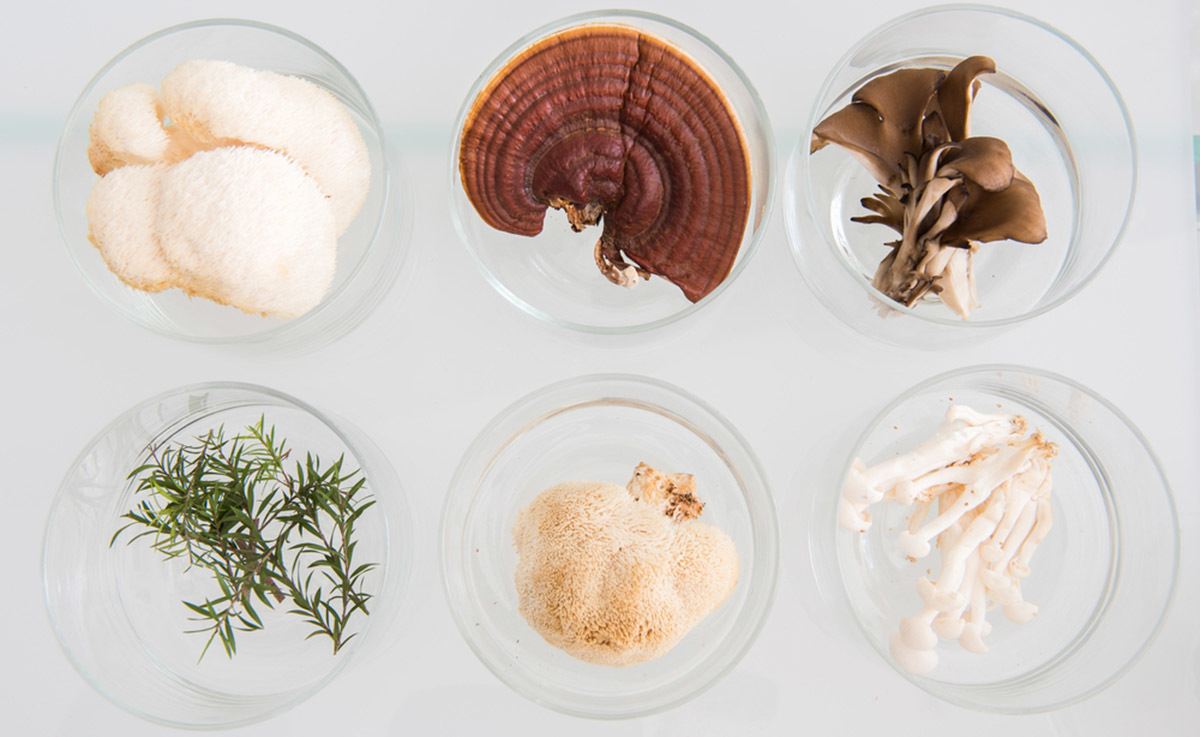
Mushrooms might seem similar to plants in the sense that they can’t move around like animals, and they take on a similar appearance with the equivalent of stems and root systems.
However, they lack leaves and chlorophyll and cannot produce energy from sunlight as plants do.
Instead, fungi use a series of enzymes to break down organic matter in their natural environment. It turns dead organic matter into carbohydrates, protein, and cellulose.
That alone makes mushrooms a valuable food resource. But mushrooms have much more to offer than their rich nutritional value.
The Medicinal Properties Of Mushrooms

Mushrooms are full of compounds that have medicinal benefits to humans. But why?
1) Antifungal, Antiviral, and Antibacterial Properties
Mushrooms live in a competitive world. They need to outcompete other molds and fungi that are looking for the same food sources as they are.
They also need to fight off bacteria and other pests who may want to eat them.
Just like poisonous animals and insects that use toxins to protect themselves, mushrooms do the same thing to prevent being eaten or taken over by other lifeforms.
Many of the compounds they produce to do this aren’t harmful to humans and act as natural antibiotics in our bodies when we consume them.
2) Vitamin And Mineral Content
Mushrooms produce the same wide range of vitamins and minerals that you’d expect to get from eating fruits and vegetables.
In fact, mushrooms produce vitamin B and vitamin D that most plants lack, so they are an excellent way for vegetarians and vegans to add extra nutrition to their diet.
Vitamins and minerals have a huge impact on human health. Being deficient in any certain element can lead to disease and other problems.
So eating mushrooms is a great way to add extra nutrition to your diet and keep yourself healthy. Mushrooms are also low in calories and sodium, but contain a good amount of protein.
Check out our article on the health benefits of mushrooms for more info on this.
3) Source Of Fiber
Mushrooms contain both soluble and insoluble fiber, so they make a great addition to your diet. Fiber is essential in maintaining intestinal health and can lower the risk of colorectal cancer and other diseases.
Fiber also makes you feel fuller for longer, so eating mushrooms that are high in fiber can be helpful for weight loss. You’re likely to eat less if you feel full and satisfied for longer.
Plus mushrooms are energy dense, meaning they have fewer calories for the same volume of food as many other things we eat.
4) High In Antioxidants
Free radicals are when oxygen molecules in our body split off into single atoms with unpaired electrons.
These electrons search throughout your body for other electrons that they can match with to form a pair. Along the way, they cause damage to your cells and DNA.
Free radicals are caused by a number of things such as UV sunlight and inflammation. As well as parts of our modern life like air pollution and smoking.
Mushrooms contain compounds called antioxidants that seek out free radicals and remove them from our bodies. This decreases the amount of oxidative stress in our bodies and damage done to our cells and DNA.
In particular mushrooms contain high amounts of the antioxidants glutathione and ergothioneine.
Wild porcini mushrooms contain the highest amount of antioxidants of any mushrooms, although all varieties naturally contain these compounds.
5) Beta Glucan
All mushrooms contain high amounts of beta glucan. This substance helps to stimulate the immune system and may offer a number of other health benefits. Including helping with allergies, asthma, chronic fatigue syndrome, and other conditions.
Shiitake and maitake mushrooms are especially rich in beta glucan.
6) Polysaccharides
Polysaccharides are long complex chains of molecules bonded together.
Mushrooms are full of a wide range of polysaccharides. Potentially 50 or more of the compounds across different varieties of mushrooms.
Different polysaccharides have different benefits. The ones found in mushrooms offer a wide range of benefits including anti-cancer, anti-obesity, anti-diabetes, and antibiotic properties.
7) Other Compounds
Altogether, mushrooms potentially contain hundreds of compounds with medical benefits. These range from boosting the immune system to anti-tumor compounds.
More and more beneficial compounds in fungi are being found by scientists every year.
In reality our knowledge of fungi and all of their potential benefits are still in the early stages.
Medicinal Mushroom Benefits

1. Fighting Cancer
Certain varieties of mushrooms added to your diet are shown to have significant positive effects when it comes to fighting cancer, leukemia, and tumors.
Compounds found in mushrooms are able to slow down the growth of existing cancer cells. As well as preventing DNA damage, cell mutation, and tumor formation to begin with.
Mushrooms offer other secondary benefits to cancer patients besides treating cancer directly as well, such as for treating hair loss and nausea.
So far no mushroom is recommended as the first line of defense against cancer all on its own. But research is showing more and more frequently that taking certain medicinal mushrooms can add measurable benefits in a battle against the disease.
2. Boosting Your Immune System
Many different types of medicinal mushrooms have antiviral and antibacterial properties as we’ve already discussed.
These can be very helpful in fighting the common cold and flu, and even more advanced and severe types of infections such as HIV.
Mushrooms contain complex sugars and high amounts of polysaccharides that are essential tools for your immune system.
They help regulate antibody production in the body and also increase DNA and RNA in your bone marrow where white blood cells and other immune cells are created.
Since mushrooms are also high in antioxidants, they can help destroy harmful free radicals that can damage your cells and cause inflammation and infection within your body.
3. Promoting Heart Health
Medicinal mushrooms (especially shiitake) contain compounds called statins. These compounds are one of the most prescribed types of pharmaceuticals for lowering blood cholesterol levels. But you can get them naturally by eating mushrooms!
Medicinal mushrooms specifically target the “bad” or LDL cholesterol in your bodies and also improve your “good” or HDL cholesterol levels.
They also lower inflammation which is a major cause of arteries hardening. Mushrooms contain phytonutrients that stop cells from sticking to blood vessel walls and forming a buildup known as plaque (referred to medically as atherosclerosis.)
Both LDL cholesterol and plaques and hardening of the arteries are major risk factors when it comes to heart attacks, stroke, and other forms of heart disease.
4. Improving Energy Levels
Medicinal mushrooms can improve your physical fitness, enabling you to run faster and engage in more intense workouts. Plus they can help to reduce your overall fatigue throughout the day.
Mushrooms contain compounds that can increase the ability of your blood cells to carry and increase the production of energy in your muscles.
They also help to reduce the accumulation of lactic acid (a waste byproduct of exercise) within your muscles and help clear the toxin from your body faster.
Other types of fungi can relax your bronchial passages and enhance respiration.
When you add all of these effects together, they help athletes to train more effectively and for longer. They also facilitate faster post-workout recovery.
This means athletes can train longer and more effectively when consuming medicinal mushrooms. They are also great during post-workout recovery.
5. Chronic Fatigue Syndrome
You don’t need to be an athlete to benefit from medicinal mushrooms.
If you always feel tired and sluggish no matter how much rest you get, you might be suffering from chronic fatigue syndrome. There’s currently no medical treatment for this disorder, although mushrooms are showing promise in helping reduce fatigue and improve the lives of CFS patients.
6. Improving Brain Health
Mushrooms can help your brain in a number of different ways.
They can improve your memory, give you sharper and clearer focus, and improve cognitive functioning.
Medicinal mushrooms also cause the production of nerve growth factors. This is vital for the treatment of Parkinson’s disease, Alzheimer’s disease, dementia, and other brain-related illnesses.
If you’ve ever seen the movie Limitless where the main character takes a drug and experiences increased IQ and laser focus as a result, imagine that medicinal mushrooms have an effect like that on your brain.
Although obviously not to that dramatic of an extent.
The mental effects of mushroom are gradual and cumulative, meaning you have to consume them consistently for a few months before you can expect to start seeing results.
7. Weight Loss
Mushrooms are low in calories and sodium, but they’re packed with vital nutrients. They also contain high amounts of fiber that will keep you feeling full and reduce the urge to snack or eat more.
I’m not suggesting you go on a mushroom-only diet, but you can eat practically as many mushrooms as you want in a day and it would be very difficult to gain weight while doing so.
So instead of reaching for a bag of candy, why not have a bowl full of mushrooms instead?
People who eat mushrooms regularly have a healthier body weight, a smaller waist circumference, and overall better health.
8. Diabetes
Mushrooms have a hypoglycemic effect, meaning they lower and regulate blood sugar levels.
They also increase the sensitivity of insulin receptors, lower triglycerides, and prevent the development of other complications related to diabetes.
Plus they have low carbohydrates and sugar compared to many other types of food, so they’re great for diabetics to eat.
9. Relieves Asthma And Allergies
Allergies are often caused by your body overreacting to a particular stimulus. Similarly, asthma is due to a large number of inflammatory cells in your body.
Mushrooms inhibit histamine release. Histamines are compounds that cells release in response to injury, inflammation, or allergies. In fact, allergy medication often contains compounds called antihistamines.
Mushrooms can help reduce the severity of allergies and asthma through a similar mechanism. By reducing the number of inflammatory cells and allergy-causing antibodies in your body and correcting imbalances in your immune system.
Mushrooms also improve the production of the cells in your body that eliminate pathogens.
10. Stress Relief
I can’t find studies to back this one up, but many people claim that medicinal mushrooms (especially reishi) can be used to promote a sense of calmness.
In traditional medicine, mushrooms have been used to treat conditions like chronic fatigue syndrome, insomnia, and stress-induced tension for hundreds of years.
11. Fertility
I’m not sure if this has been tested in humans yet. But in both boars and mice the Cordyceps sinensis mushroom has shown promising results for male fertility and sperm production.
So if you’re a male planning to start a family any time soon, you might want to add some cordyceps to your diet.
It could dramatically increase sperm production, both in terms of quantity and quality.
Good post. I learn something totally new and challenging on websites I stumbleupon every day. Its always exciting to read articles from other writers and practice a little something from other sites.